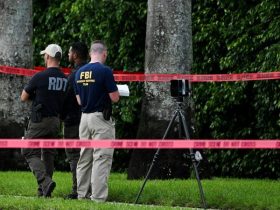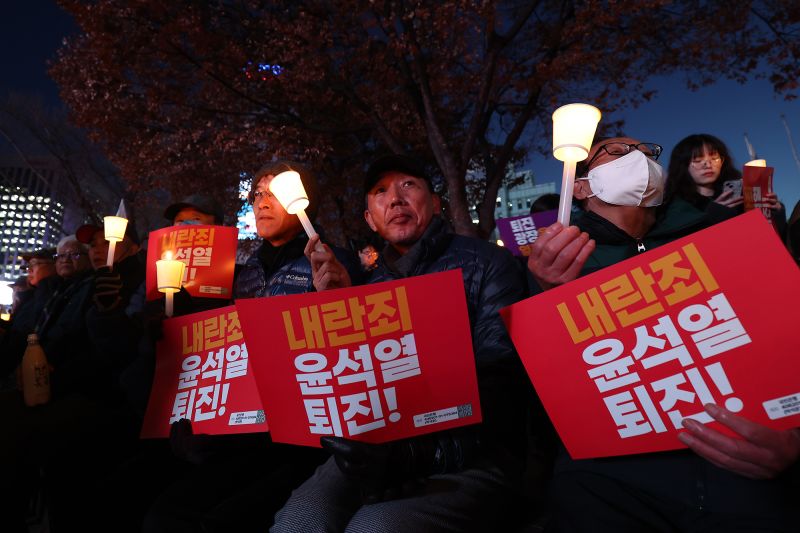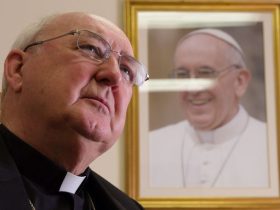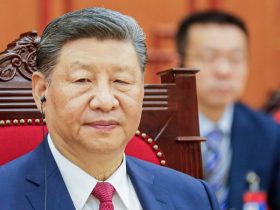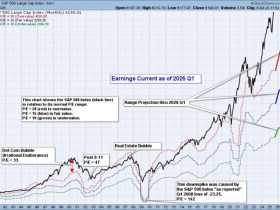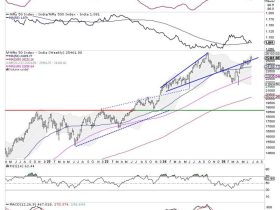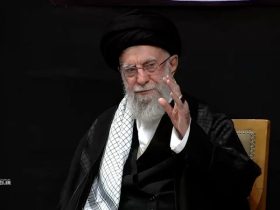Candle-lit vigils and rallies were held across South Korea on Wednesday, a nation outraged and frustrated by the president’s surprise declaration of martial law the night before called for his resignation.
Outside the National Assembly Hall in the capital Seoul, hundreds of people gathered on the steps as inside, opposition parties attempted to impeach President Yoon Suk Yeol, whose six hours of martial law sent shockwaves through the country and plunged Asia’s fourth-largest economy into political uncertainty.
For Mi-rye, 64, the short-lived decree brought back dark memories of a more painful, authoritarian past defined by mass arrests and human rights abuses.
“A sense of fear completely overwhelmed me,” Mi-rye, who only wanted to go by her first name for fear of retribution, said after watching Yoon’s address late Tuesday night.
She couldn’t sleep and so travelled from her home city of Paju in Gyeonggi Province, near the border with North Korea, to Seoul to “stay vigilant.”
After army major general Chun Doo-hwan seized power in a coup and declared martial law in the 1980s, people lived under strict curfews and “anyone caught outside was taken to the Samcheong re-education camp,” Mi-rye said.
“Even stepping outside to smoke could get you arrested,” she said. “People walking on the street without their ID cards were detained. Plainclothes officers were stationed everywhere, waiting to catch people.”
Under his rule, opponents were arrested, universities closed, political activities were banned and the press stifled. Nearly 200 people were killed in 1980 when Chun sent in the military to crush student pro-democracy demonstrations.
Kyung-soo, who also wanted to go by just his first name, says his fear “stems from the actions of a government that seems disconnected from the voices of its people.”
Martial law “is not just a distant memory,” he said.
“It is a painful reminder of how easily democracy can be threatened.”
It’s a message that appears to have resonated even with those who have only known democracy in South Korea.
Moon Seo-yeon is just 15 years old, but she was determined to join the rallies in Seoul on Wednesday, saying Yoon’s declaration of martial law was a “mistake” and showed a “complete lack of consideration.”
For Moon, the martial law decree was the latest in a litany of grievances, and she feels no progress has been made during his time in office.
“During Yoon’s term, there have been many significant events that were either poorly handled or not addressed at all. It feels like there’s been no progress, or worse, steps backward,” she said.
“The response to the Halloween tragedy was slow, highlighting poor political leadership,” she said, referencing a crowd crush that killed more than 150 people.
“I may not be old or very knowledgeable, but since the country is in a state of emergency, I want to contribute, even if it’s just a small effort,” she said.
Questions have now turned to what comes next as Yoon faces growing backlash across from across the political spectrum, including within his own party.
There is mounting pressure for him to resign. Protesters began marching down the center of the city Wednesday evening, calling for him to be arrested.
Six opposition parties have submitted a bill calling for his impeachment. Meanwhile, the main opposition Democratic Party, said it had begun formalizing treason charge plans against the president, as well as the defense and interior ministers.
Mi-rye, who traveled to Seoul to take part in the rallies, said she will keep protesting until Yoon steps down.
”Although there is some relief after the martial law was lifted, there is still concern that it could be re-declared,”
“That’s why I am here,” she said.


